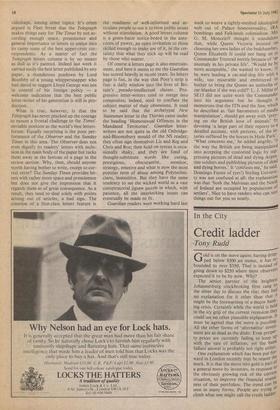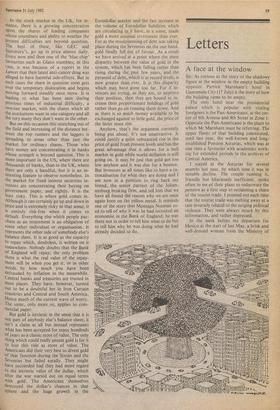In the City
Credit ladder
.Tony Rudd
Gold is on the move again; having droP" ped below $300 an ounce, it has re- bounded to over $350. That is instead of going down to $250 where most observers expected it to be by now. Why? The senior partner of the brightest Johannesburg stockbroking firm rang 0, the other day to discuss the rise; they ha' no explanation for it other than that it might be the forewarning of a major bank' ing crisis. Certainly while the world is held in the icy grip of the current recession theY could see no other plausible explanatiofl. ft must be agreed that the move is puzzling. All the other forms of 'alternative' invest' ment are as dead as the dodo. Even proPer" ty prices are currently failing to keep UP with the rate of inflation, yet the bank failure answer is probably not right either. One explanation which has been put for- ward in London recently may be nearer the mark. It is that the move into gold is part 0' a general move by investors, in response t° the obviously growing risk of the curreat situation, to improve the financial sound- ness of their portfolios. The trend can be seen in many forms. People are trying t° climb what one might call the credit ladder. In the stock market in the UK, for in- stance, there is a growing concentration Upon the shares of leading companies Whose soundness and ability to weather the Present difficulties are beyond question. The best of these, like GEC and Sainsbury's, go up in price almost daily. Every now and then one of the 'blue chip' favourites such as Glaxo stumbles; in this case, it was because of a report in the Lancet that their latest anti-cancer drug was alleged to have harmful side-effects. But in such cases the share in question soon gets over the temporary dislocation and begins moving forward steadily once more. It is leading to what has been seen during Previous times of industrial difficulty, a two-tier market, with the shares which all the institutions want in one category and all the very many they don't want in the other.
But on this occasion this stretching out of the field and increasing of the distance bet- ween the top runners and the laggers is spreading to areas other than just the Market for ordinary shares. Those who have money are concentrating it in banks Whose strength is beyond question. This is more important in the US, where there are thousands of banks, than in the UK, where there are only a handful, but it is an in- teresting feature to observe nonetheless. In the market for fixed interest securities in- vestors are concentrating their buying on government paper, and rightly. It is the least risky. This is where gold comes in. Although it can certainly go up and down in Price and is extremely risky in that sense, it is entirely risk-free when it comes to default. Everything else which people pur- chase as an inv,estment is an obligation of some other individual or organisation. It represents the other side of somebody else's balance sheet. It is as good as the capacity to repay which, doubtless, is written on it somewhere. Nobody doubts that the Bank Of England will repay; the only problem there is what the real value of the repay- ment will be when you get it, or in other words by how much you have been defrauded by inflation in the meanwhile. Central banks and treasuries are trusted in Most places. They have, however, turned out to be a doubtful bet in Iron Curtain countries and Central and South America. Hence much of the current wave of worry. The same, only more so, applies to com- mercial paper.
But gold is intrinsic in the sense that it is not part of anybody else's balance sheet; it isn't a claim at all but instead represents What has been accepted for many hundreds of years as a classic store of value. The only thing which could really unseat gold is for it to lose this role as store of value. The Americans did their very best to divest gold of that function during the Sixties and the Seventies but failed .totally. They might • have succeeded had they had more regard to the intrinsic value of the dollar, which after the war started out on equal terms With gold. The Americans themselves destroyed the dollar's chances in that Sphere and the huge growth in the Eurodollar market and the fast increase in the volume of Eurodollar liabilities which are circulating in it have, in a sense, made gold a more unusual investment than ever. For as the mushrooming of debt was taking place during the Seventies on the one hand, gold finally fell out of favour. As a result we have arrived at a point where the sheer disparity between the value of gold in the system, which has been falling rather than rising during the past few years, and the pyramid of debt, which is at record levels, is now greater than ever. It this disparity which may have gone too far. For if in- vestors are trying, as they are, to improve their position, then they are bound to in- crease their proportionate holdings of gold rather than go on running them down. And as there is so much money available to be exchanged against so little gold, the price of the latter must rise.
Anyhow, that's the argument currently being put about. It's not unattractive. It could justify a quite substantial rise in the price of gold from present levels and has the great advantage that it allows for a bull market in gold while world deflation is still going on. It may be just that gold got too low anyhow and it was due for a bounce. But investors at all times like to have a ra- tionalisation for what they are doing and I am now in a position to ring back my friend, the senior partner of the Johan- nesburg broking firm, and tell him that we have all found the reason why we are once again keen on the yellow metal. It reminds one of the story that Montagu Norman us- ed to tell of why it was he had recruited an economist in the Bank of England; he was there not in order to tell him what to do but to tell him why he was doing what he had already decided to do.







































 Previous page
Previous page